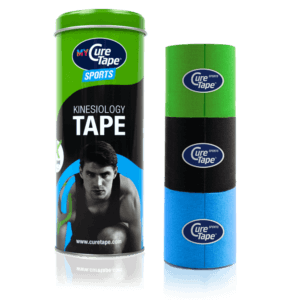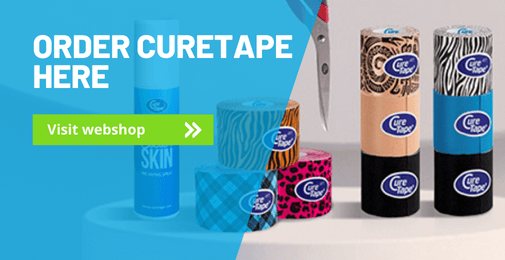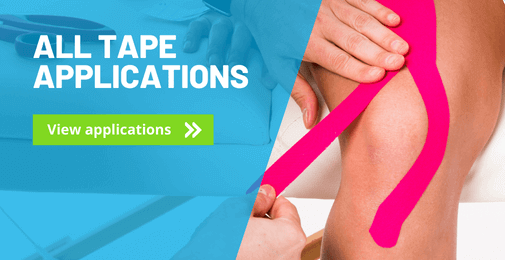Hallux valgus, also known as a bunion, is a crooked big toe. It is the most common foot deformity. With this problem, the first metatarsal bone shifts more and more to the outside of the foot, causing the foot to widen. There are different causes for a hallux valgus, e.g. wearing the wrong shoes, a genetic predisposition, a lot of standing, etc. It is almost always caused by a flat foot. Over time, a crooked position of the big toe develops. The tape described here mainly helps to relieve the discomfort like red toe, pain, and pressure sensitivity. However, the tape cannot reduce the hallux valgus and influence the deformity permanently. Should the pain persist for a longer period, or move to the other toes, please consult an expert. Aids such as good footwear, insoles, night splints, and foot and toe exercises can help reduce the pain.
How to tape a bunion
Tips for a good foot taping application:
- Is the cause of the complaint or pain clear?
- Check if there any contraindications for not taping.
- Before you start taping, carefully read the instructions.
- Choose a colour of tape, any colour that fits your mood!
- Round of all the edges to prevent peeling.
- Do not stretch the tape at the beginning and the end.
- Rub the tape well for adhesion. Heat activates the adhesive layer.
- Showering or swimming is possible, pat the tape dry after it gets wet. Do not rub it hard.
- It is easier to remove the tape with body or massage oil.

Christina’s advice when taping your foot
In the self-taping instructions, I have chosen taping applications that are easy to apply yourself. In order to make this treatment safe, I give practical tips, which you should take into account before, during and after a tape treatment. They are based on my years of practical experience. If the complaints persist, always consult a therapist or doctor.
Instruction
Tape
Shape:Y-Tape.
Number of strips: 2.
Technique: correction technique (big stretch).
Measuring and cutting the tape
Step 1:
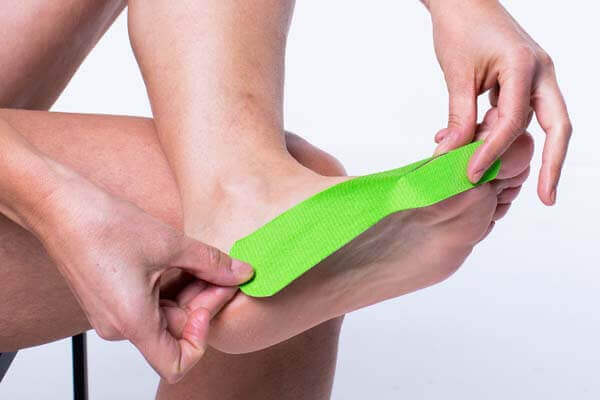
- Sit on a chair and put your lower leg on the other leg to easily reach the foot to be treated.
- Measure the required tape length for the first tape from the outside of the big toe to the heel. Cut in the tape approximately 5 cm on one side.
- For the second tape, measure from the ball of the big toe across the top of your foot to the outside of the ankle. Cut in the tape to the last 5 cm.
Applying the tape
Step 1:
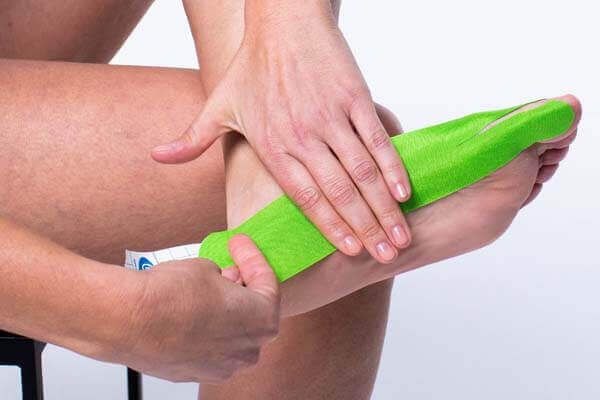
Step 2:
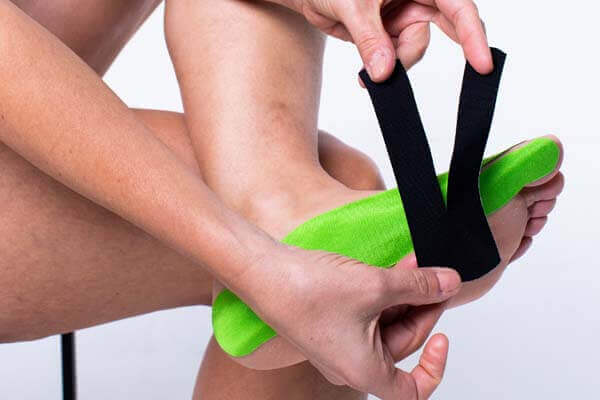
Step 3:
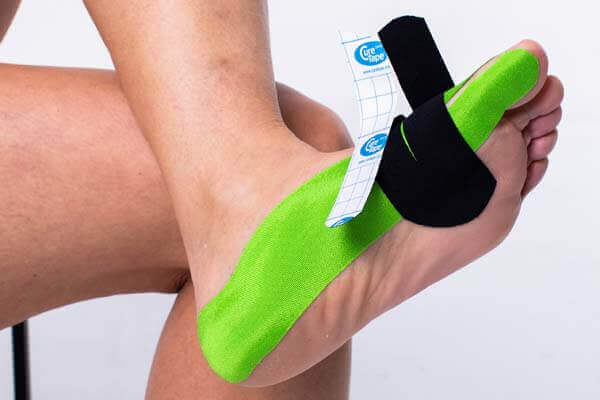
Step 4:
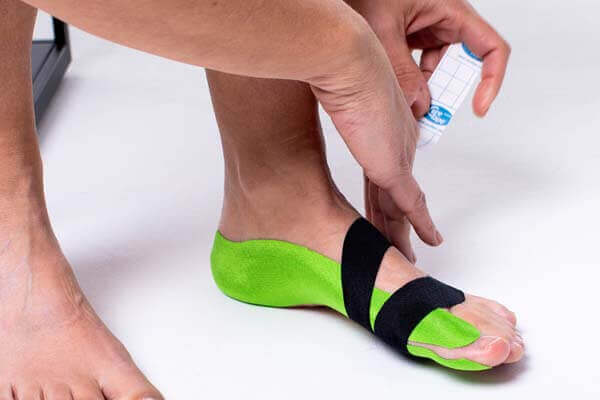
Step 5:
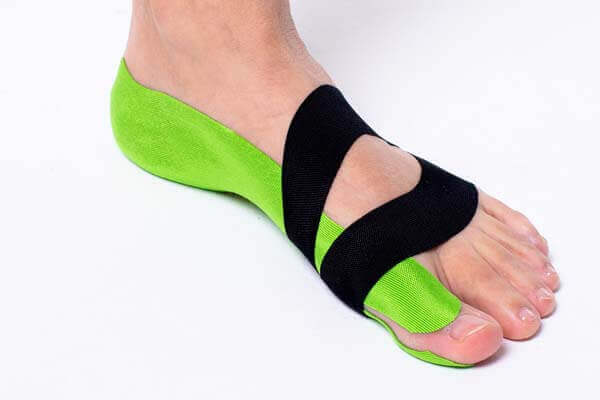
- Carefully place the strips of the first tape (base) around the big toe. Make sure there are no wrinkles! Pull the tape with a good stretch in the direction of the heel, following the inside of the foot. Rub the tape on well.
- Place the base of the second tape under the ball of the foot.
- The first strip follows the toe line at the top of the foot with slight stretching.
- The second tape strip runs across the top of the foot and ends just before the side of the ankle.
- Finally, rub the tapes well.
Popular products to tape your foot
-
MYCureTape® – 3 Rolls Kinesiology Tape – Value Pack
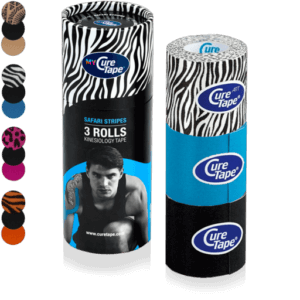 $26.95
In stockSelect options This product has multiple variants. The options may be chosen on the product page
$26.95
In stockSelect options This product has multiple variants. The options may be chosen on the product page -
Book: The Ultimate Kinesiology Taping Guide
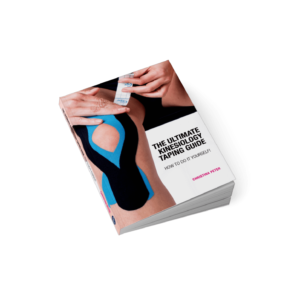 $29.95
In stockAdd to cart
$29.95
In stockAdd to cart -
CureTape® Ultimate Self-Tape Starter Kit
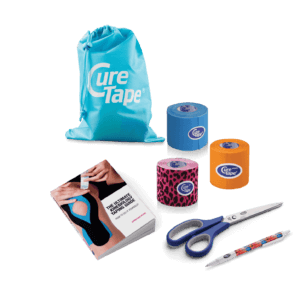 $87.95
In stockAdd to cart
$87.95
In stockAdd to cart
Learn how to tape
- 30 taping instructions for common injuries that taping can help you with
- 176 pages of clear written instructions
- 200 step-by-step instructions accompanied by photo’s, illustrations and scannable video’s through QR codes
What are you waiting for? Order your copy today!
*This book is intended for people who want to tape an injury or complaint themselves. If uncertain about the complaint, consult a physiotherapist.
THYSOL is the manufacturer of the kinesiology tape brand CureTape. As CureTape, we have been training and supplying professionals for almost 25 years. And consumers now know how to find us too! By manufacturing all our tapes in our own factory, we can guarantee the best quality!
Please note that the indicated tape applications and information on our website about the possibilities with kinesiology tape have not yet been scientifically proven. The statements and examples mentioned are based on long-term experiences of patients and trained therapists.
Contraindications not to tape: pregnancy, open wounds, broken bones, unexplained complaints, allergies and skin diseases, use of medication such as blood thinners, thrombosis and fever. Always apply tape in consultation with a specialist.

